Beverly Hills was chosen as the location for the brand’s first store, designed as a “private residence for modern monarchs.”
The Legends Behind 4 ‘Cursed’ Gemstones
Ahead of Halloween, Associate Editor Lenore Fedow shares the spooky tales behind a few famous gemstones that allegedly bring bad luck.

Halloween is my favorite holiday, hands down.
I can’t get enough of this time of year, from the candy and costumes to the pumpkin patches and spooky stories. I’m not much for horror movies, but I do love a good, creepy urban legend.
So, on the eve of Halloween, I wanted to share some tales of spookiness surrounding “cursed” gemstones.
The Hope Diamond
The Hope Diamond is one of the most famous diamonds in the world, passed down through notable hands throughout history and put on display in world-renowned museums.
Those who have come in contact with the stone range from kings and queens to merchants and jewelers, but all are said to be bound by its curse.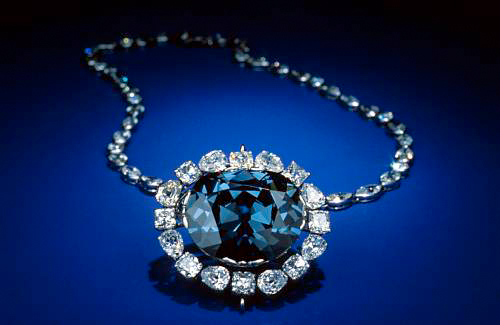
Tavernier sold the diamond to King Louis XIV of France in 1668. It was recut to 67 carats and set in gold, worn around the king’s neck for ceremonial occasions.
Later in his life, Tavernier was mauled to death by dogs, according to some accounts (though others say he retired to Russia and died of natural causes.)
As for King Louis XIV of France, whose life was better documented, he died of gangrene while all but one of his children died in childhood.
The diamond was passed on to King Louis XV, who had the stone reset, and later died of smallpox.
It made its way to King Louis XVI and Marie Antoinette, but was turned over to the government alongside the other jewels of the French Royal Treasury after the pair attempted to flee France and were subsequently beheaded.
In 1949, American jeweler Harry Winston purchased the Hope Diamond from the estate of socialite Evalyn Walsh McLean.
The Washington Post heiress lived a less-than-charmed life. The death of her mother-in-law was followed by the death of her 9-year-old son. Her husband left her for another woman, but later died in a mental hospital. Her daughter died of a drug overdose at the age of 25.
And McLean herself died with a mountain of debt, forcing her remaining children to sell the newspaper and the Hope Diamond.
Its new owner, Winston, loaned it to several museums
Not even the mailman who delivered the stone to the museum was spared.
Shortly after making the delivery, James Todd was in two car accidents, suffering a leg and head injury, according to the Smithsonian’s National Postal Museum. His wife died of a heart attack and his dog was strangled on its leash.
To add insult to literal injuries, Todd’s Maryland home partially burned down.
So, what is the source of all this bad juju allegedly generated by the Hope? Legend has it Tavernier stole the diamond from one of the eyes of a Hindu idol and the lingering curse is the result.
Black Orlov
The Black Orlov, a now 67.50-carat cushion-cut black diamond, has an interestingly similar backstory.
Also known as The Eye of Brahma, a monk removed the diamond from the eye of the idol of Brahma (the creator god in Hinduism) at a shrine near Pondicherry in the early 1800s, according to a report by The Independent.
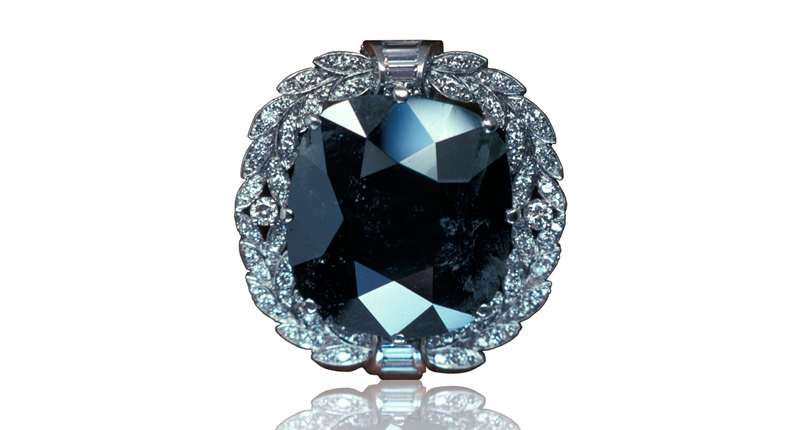
The curse is said to have led three owners of the diamond to kill themselves in the same way, by jumping to their deaths from tall buildings.
J.W. Paris, the diamond dealer who brought the stone to the United States, jumped from a New York building in 1932 after the stone was sold. Fifteen years later, a pair of Russian princesses, Nadia Vyegin-Orlov and Leonila Galitsine-Bariatinsky, also jumped to their deaths within a month of each other.
Looking to rid the diamond of its curse, owner and gem dealer Charles F. Winson recut the black diamond.
The Black Orlov is now set in a diamond brooch suspended from a diamond necklace.
The Koh-i-Noor Diamond
The Koh-i-Noor Diamond also got its start in India, originally a part of a glitzy throne commissioned by Mughal ruler Shah Jahan in 1628, according to the Smithsonian.
The ruler’s throne took seven years to make and cost four times as much as the Taj Mahal’s construction as it was covered in rubies, emeralds, diamonds and pearls. The Koh-i-Noor diamond was placed at the top of the throne, set into the head of a peacock.
When Persian ruler Nader Shah invaded Delhi in 1739, the Peacock Throne and the Koh-i-Noor diamond were looted and taken to present-day Afghanistan.
The diamond exchanged hands several times and eventually found its way to England to become part of the Crown Jewels, but not before allegedly bringing bad luck along the way.

Author and former Indian ambassador to the U.S. Navtej Sarna spoke about the curse of Koh-i-Noor at an event held by the Asia Society last October.
According to Sarna’s speech, it was a rough trip for those transporting the diamond from India to England. An outbreak of cholera struck the ship. Filled with sick passengers, the ship was denied entry at a nearby port and had to keep going, head first into a fierce storm.
The diamond eventually made its way to London, but the bad luck didn’t stop there.
Shortly after, Queen Victoria was struck by a man with an iron-topped cane and got a black eye. Around the same time, her former prime minister, Robert Peel, fell off his horse, which then fell onto him, killing him.
The diamond was put on display for the public , but the presentation left much to be desired, so Prince Albert had the diamond re-cut to up the wow factor, Sarna said.
Today, the Koh-i-Noor diamond is an oval modified brilliant cut that weighs 105.60 carats, according to the Gemological Institute of America.
The stone was last seen in public in 2002, set atop the coffin of Queen Elizabeth The Queen Mother at her funeral.
La Peregrina
Not all cursed jewels are diamonds. Pearls have joined in on the fun too.
The pearl that came to be known as La Peregrina (Spanish for "the wanderer") was found off the coast of Panama in the mid-16th century, according to pearl purveyor Assael’s website.
Don Pedro de Temez, administrator of the Panama colony, hand-delivered the pearl to Spain and gifted it to future King Phillip II, who in turn gave it to Queen Mary I of England.
The 50.56-carat, pear-shaped pearl made an appearance in Queen Mary’s 1554 portrait by Antonis Mor.
Queen Mary, a devout Roman Catholic, had hundreds of Protestants burned at the stake during her reign, earning her the nickname Bloody Mary. Rarely seen without the pearl, it is said Bloody Mary wore the gemstone to these executions, adding to its supposed bad energy.

Queen Mary and her husband King Philip II of Spain had a rocky relationship, to say the least, with her husband living abroad for most of their marriage.
When she died during the influenza epidemic of 1558, her husband wrote in a letter: “I feel a reasonable regret for her death.” Soon after, he proposed to her half-sister Elizabeth, who refused him.
The enormous natural pearl changed hands several times over the next century, eventually being auctioned at Sotheby’s London in 1969.

Taylor was notorious for her many marriages, having seven husbands throughout her life (including Burton twice).
After her death in 2011, an anonymous buyer paid more than $11 million for La Peregrina at Christie’s record-setting sale of Taylor’s jewelry.
Fact or Fiction?
I reached out to Isabelle Corvin, staff gemologist at Panowicz Jewelers in Washington state, to get an expert’s opinion on allegedly cursed jewelry.
Corvin is a self-proclaimed gem nerd who previously helped me with my story on gemstone legends, delving into why opals are allegedly bad luck and other myths.
She noted that a common thread that winds its way through all these stories is that the jewels were acquired illegitimately, usually through theft or looting.
“Perhaps these tales of curses and ill omens should be viewed the same as ancient and classic fables; cautionary stories to dissuade bad behavior,” she wrote in an email.
Richard Kurin, a scholar and author of “ Hope Diamond: The Legendary History of a Cursed Gem,” echoed a similar sentiment about the origin of a “curse” in an interview with Smithsonian Magazine.
“When the powerful take things from the less powerful, the powerless don’t have much to do except curse the powerful,” he said.
In the case of the Koh-i-Noor diamond, Duleep Singh met with Queen Victoria later in his life, and she offered to show him the famous diamond stolen from him.
According to Sarna, after admiring it in the light, Singh handed the stone back to the queen and said he was now giving it to her, transforming the diamond from stolen treasure to a gift and, perhaps, lifting the curse.
“While I am generally not a superstitious person, I do believe that gemstones are able to absorb energy, so there may be some truth to these ‘curses’ in the sense of pieces with traumatic pasts retaining a bit of darkness,” Corvin said.
I’m no closer to finding out if curses are real but I do believe in karma, which can be just as spooky.
The Latest

Kering, Apple, and other retailers have reportedly temporarily closed stores in the Middle East region in light of the recent conflicts.
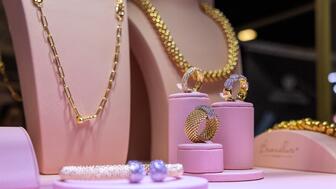
Nearly half of buyers are prioritizing silver and fashion collections this season, organizers said.

Every jeweler faces the same challenge: helping customers protect what they love. Here’s the solution designed for today’s jewelry business.

The “Live Now. Polish Later.” campaign features equestrians wearing the brand’s jewels while galloping across the icy plains of Kazakhstan.


The precious metals provider has promoted Jennifer Ashworth to the role.

Nelson will be honored as the inaugural grant winner at the Gem Awards gala on March 13.

With refreshed branding, a new website, updated courses, and a pathway for growth, DCA is dedicated to supporting retail staff development.

Experts from India weigh in the politics, policies, and market dynamics for diamantaires to monitor in 2026 and beyond.

The American precious metals refiner’s day-to-day operations remain the same post-acquisition.
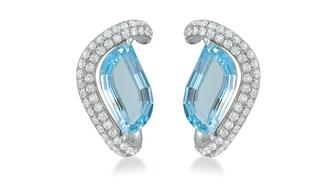
These aquamarine jewels channel the calming energy of the March birthstone.
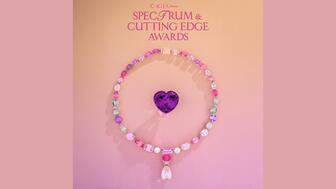
The “Innovative Design” category and award will debut in the Spectrum division of this year’s AGTA Spectrum & Cutting Edge Awards.

Consumers were somewhat less worried about the future, though concerns about rising prices and politics remained.

Foerster is this year’s Stanley Schechter Award recipient.

Sponsorships and tickets to the annual fundraising event, set for May 31, are available now.

Chicago police and members of the U.S. Marshals Service tracked down the 35-year-old suspect earlier this week in St. Louis.

Owners of the Ekapa Mine reportedly filed for liquidation about a week after a mudslide trapped five workers who have yet to be found.
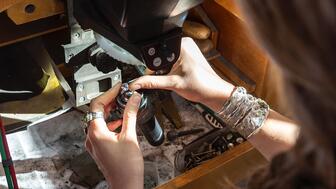
A 10-year alliance has also begun to address the shortage of bench jewelers through scholarships, enhanced programs, and updated equipment.
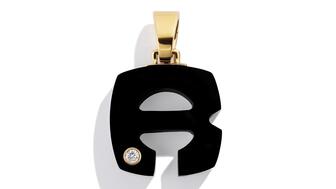
The “Splendente” collection has evolved to feature hardstone letter pendants, including our Piece of the Week, the onyx “R.”
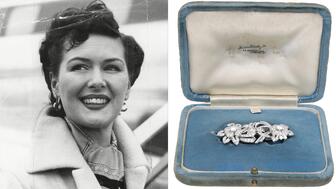
The jewelry collection belonged to “one of society's most glamorous and beautiful women of the mid-20th century,” said the auction house.
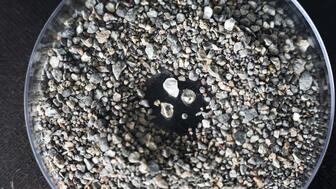
The update came as Anglo took its third write-down on the diamond miner and marketer, which lost more than $500 million in 2025.

Emmanuel Raheb discusses the rise of “GEO” and the importance of having well-written, quality content on your website.

Each received around four years for burglarizing a jewelry store and a coffee shop in Simi Valley, California, last May.
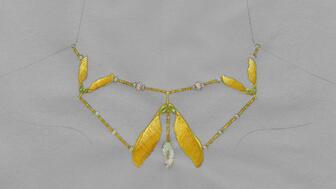
Catherine Aulick, a GIA graduate, received the ninth and final Gianmaria Buccellati Foundation Award for Excellence in Jewelry Design.
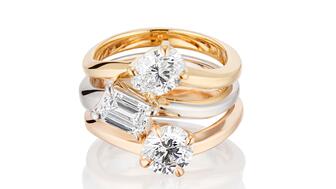
We asked a jewelry historian, designer, bridal director, and wedding expert what’s trending in engagement rings. Here’s what they said.

Are arm bands poised to make a comeback? Has red-carpet jewelry become boring? Find out on the second episode of the “My Next Question” podcast.
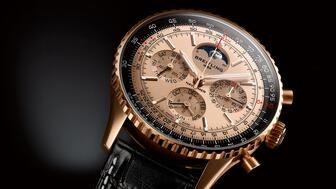
The Swiss watchmaker is battling declining sales amid a rapid retail expansion, according to a Financial Times report.





























